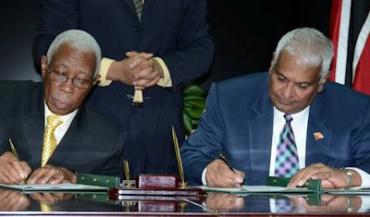Trinidad and Tobago’s Foreign Minister Winston Dookeran had been invited to Kingston for talks by Nicholson after Port of Spain had refused entry to 13 Jamaican nationals last month that had escalated into a threat of a trade war between the two CARICOM members.
KINGSTON, Jamaica, Wednesday December 4, 2013, CMC – Jamaica and Trinidad and Tobago have signed an agreement outlining a path to improve free trade and free movement between the two countries.
“I think we have …created a platform for addressing not only the issues which brought this meeting together, but for a wider set of considerations, both in our bilateral relations, and in the relations within the wider CARICOM (Caribbean Community),” Trinidad and Tobago’s Foreign Minister Winston Dookeran said in a statement.
He said he had also extended an invitation to his counterpart, Arnold J. Nicholson to visit Port of Spain by the end of the first quarter of 2014 for further consultations, having recognized the need to follow up on agreements coming out of these last two days.
Dookeran had been invited to Kingston for talks by Nicholson after Port of Spain had refused entry to 13 Jamaican nationals last month that had escalated into a threat of a trade war between the two CARICOM member states.
Jamaica had been critical of the decision and the Ministry of Foreign Affairs issued a warning to nationals travelling to Trinidad and Tobago saying it was also concerned at this development and was continuing to interface with the relevant authorities in Trinidad and Tobago on the matter particularly in light of the Shanique Myrie ruling by the Caribbean Court of Justice (CCJ).
“Given the paradigm shift in immigration law and procedures in relation to the treatment of CARICOM nationals entering countries of the region, both our countries recognized the need for a common approach and interpretation of the law,” Nicholson told reporters at the end of the talks on Tuesday.
He said that among the decisions coming out of the discussions, was the need for hassle-free movement for Jamaicans into Trinidad and Tobago, stressing that this must be applied in conformity with Community Law.
There was also agreement between Port of Spain and Kingston that there must be a review of national legislation, to ensure uniformity in the application of the Myrie ruling by the CCJ.
The CCJ earlier this year ruled that Barbados had breached the right of Myrie when she sought entry into the country in 2011, but stopped short of awarding the one million Barbados dollars in compensation she had sought.
Myrie, 25, had been granted leave by the CCJ to file the action, alleged that when she travelled to Barbados on March 14, 2011 she was discriminated against because of her nationality, subjected to a body cavity search, detained overnight in a cell and deported to Jamaica the following day.
Nicholson told journalists that notwithstanding the fact that a significant number of Jamaicans has entered Trinidad and Tobago without any difficulty within the last year, it was agreed that the immigration authorities of both countries must cooperate in addressing allegations of profiling.
Dookeran said it would be “fair to say that we have diffused the tensions which were generated by the immigration issues recently brought to light and we want to move forward now, on the basis of our mutual interests, which again, have implications for the interests of the regional integration process itself.
“What we have been able to establish during these two days of intense discussions, at least from the Trinidad and Tobago side, is the little known fact that numbers have demonstrated that for the period 2010 to 2013, 56,324 nationals of Jamaica sought entry into Trinidad and Tobago, of whom 54,362 or 96 per cent were landed”.
He said the two countries have also agreed “there needs to be a period of reflection and development of mechanisms and procedures that take into account the realities brought about by Community Laws on the issue of the movement of CARICOM nationals within the region”.
“This meeting agreed, for example, that there needs to be an urgent meeting of CARICOM Heads of Immigration Departments to elaborate on ways to sensitise their officials on the fair treatment of CARICOM nationals exercising their rights within the Community.
“To this end, further discussion is necessary to arrive at a greater understanding of a common approach toward implementing the decisions of the CARICOM Heads of Government and relevant organs,” Dookeran said, adding “we have committed to closer cooperation and information sharing on matters of mutual interest among our Immigration agencies, Foreign Ministries and respective High Commissions”.
“Overall, I feel confident that over these last two days, we have gone some distance in easing the tensions which have been generated by one single issue and which had the potential to frustrate our good bilateral relations, which themselves could have led to difficulties on a much broader front,” Dookeran said.















